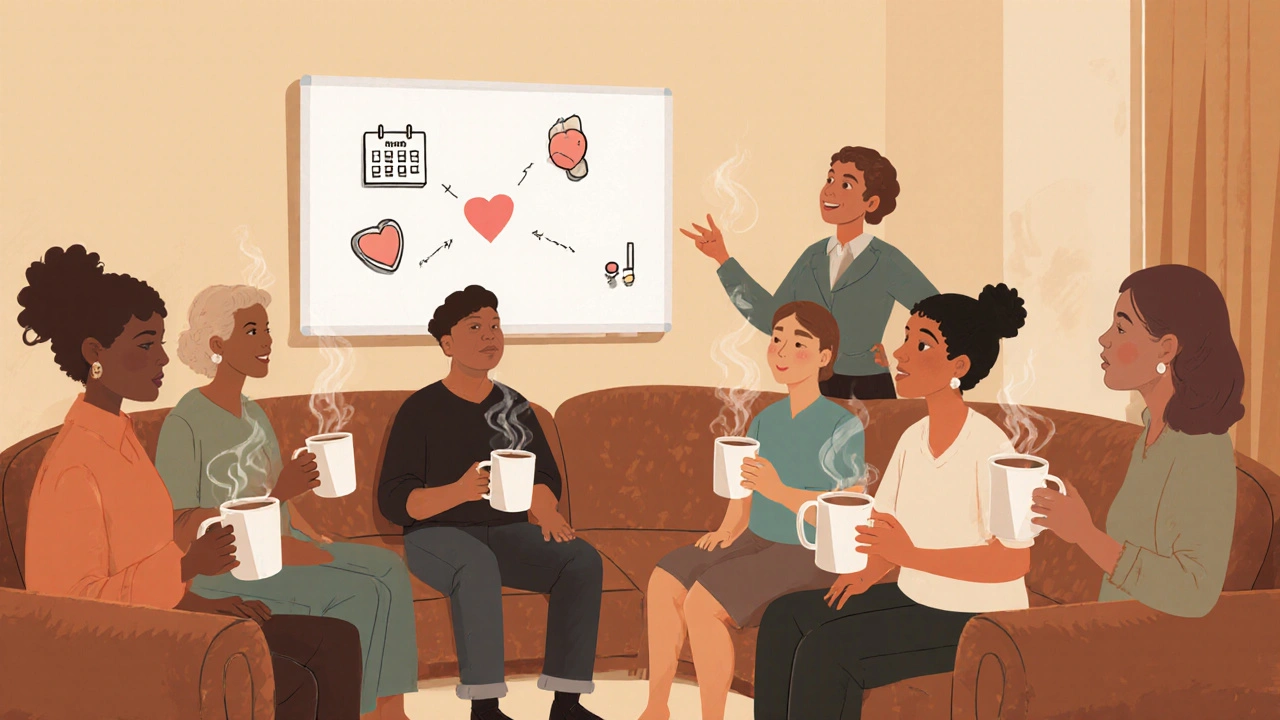When a loved one receives a dementia diagnosis, the whole family feels the ripple. Dementia is a progressive condition that impairs memory, thinking, and the ability to carry out everyday tasks. It affects not only the person diagnosed but also spouses, children, and even extended relatives who suddenly become caregivers, decision‑makers, and emotional anchors.
TL;DR
- Focus on clear communication and realistic expectations early on.
- Build a support network that includes groups, respite services, and professional advice.
- Use practical daily tools-calendars, safety modifications, and routine‑based cues-to reduce stress.
- Plan legally and financially now to avoid crisis later.
Understanding How Dementia Changes Family Life
Families often go from a predictable routine to an unpredictable maze. Memory loss can turn simple conversations into confusion, and mood swings may spark arguments that never happened before. The emotional weight is heavy: spouses worry about losing a partner, children fear losing a parent, and siblings may feel left out of decisions.
Research from the UK Alzheimer’s Society shows that 60% of family caregivers report “significant” stress within the first year of diagnosis. That number climbs as the disease advances, especially when behavioral changes like aggression or wandering appear.
Emotional and Practical Challenges
Two major stressors dominate:
- Emotional overload: Grief, guilt, and anxiety intertwine. Many relatives feel they’re losing the person they knew while still needing to care for them.
- Practical burden: Appointments, medication management, and safety checks become daily tasks.
Both can erode personal health. A study in the British Medical Journal found caregivers have a 1.5‑fold higher risk of depression compared to non‑caregivers.
Building a Support Network
Going it alone rarely works. Identify three pillars of support:
- Support groups are community‑based gatherings where families share stories, practical tips, and emotional validation. In Liverpool, the Dementia Caregivers’ Forum meets monthly and offers a safe space for venting.
- Respite care provides short‑term, professional supervision, giving primary caregivers a break. Options range from half‑day at‑home services to weekend stays at specialized dementia care homes.
- Healthcare professionals such as neurologists, dementia nurses, and occupational therapists bring clinical expertise and can tailor interventions to each stage of the disease.
When you map these resources, you’ll notice they often overlap-many support groups also host guest speakers from the health sector, and respite providers can advise on environmental safety.
Daily Coping Strategies That Work
Implementing small, consistent habits can transform a chaotic day into a manageable one.
- Establish a visual routine: Use large‑print calendars, colour‑coded stickers, and simple step‑by‑step picture cards. Over 70% of families who adopt visual cues report reduced confusion for the person with dementia.
- Safety‑first home modifications: Install grab bars, remove loose rugs, and lock away hazardous chemicals. A British safety audit showed that homes with these changes see 30% fewer accidents.
- Communicate with empathy: Speak slowly, maintain eye contact, and validate feelings even if the statement seems illogical. Validation techniques lower agitation by up to 40%.
- Self‑care routine for caregivers: Schedule 15‑minute mindfulness breaks, maintain a regular sleep schedule, and keep up with personal hobbies. Caregivers who set aside time for themselves report higher resilience.

Planning for the Future: Legal and Financial Steps
Early planning avoids frantic decisions later. Key actions include:
- Legal planning involves drafting lasting powers of attorney (LPA), setting up advance directives, and clarifying inheritance wishes.
- Financial planning means reviewing benefits, pensions, and possible eligibility for dementia‑specific support funds such as the NHS Continuing Healthcare package.
Engage a solicitor experienced in elder law and a financial adviser familiar with NHS funding rules. Their guidance ensures the person’s preferences are respected while protecting the family’s financial health.
Comparison of Common Support Options
| Option | Cost (UK avg.) | Frequency | Key Benefits |
|---|---|---|---|
| Support Group | £0-£15 per meeting | Monthly | Emotional validation, peer learning, low cost |
| Respite Care | £80-£150 per day | As needed (often weekly) | Caregiver recharge, professional supervision |
| Professional Home Care | £18-£25 per hour | Daily or part‑time | Personalised assistance, routine consistency |
| Day‑care Centre | £60-£90 per day | Weekdays | Social stimulation, structured activities |
Choose the mix that fits your budget, time constraints, and the stage of dementia. Many families start with support groups, add respite care when stress spikes, and later incorporate professional home care as cognitive decline progresses.
Resources & Professional Help
Beyond the local groups, national organisations provide credible guidance:
- The Alzheimer’s Society (UK) - free helpline, printed guides, and online webinars.
- Dementia UK - offers a volunteer companionship service that can ease loneliness for both the person with dementia and the caregiver.
- Local NHS Memory Clinics - provide diagnosis, medication reviews, and care planning.
When you contact these services, have a list of questions ready: medication side‑effects, future housing options, and eligibility for community grants. Being prepared shows respect for the professionals’ time and gets you faster answers.
Putting It All Together: A Practical Checklist
- Confirm diagnosis and stage with a neurologist.
- Establish a visual daily routine.
- Join a local support group within the first month.
- Schedule a home safety audit and install needed modifications.
- Set up an LPA and discuss advance directives with a solicitor.
- Arrange at least one respite care session per month.
- Review benefits and financial aid options every six months.
- Prioritise caregiver self‑care: exercise, sleep, and social outlets.
Following this checklist reduces the guesswork and creates a proactive rather than reactive approach to dementia care.
Frequently Asked Questions
How early should I start legal planning after a dementia diagnosis?
Ideally within the first three months, while the person can still express informed preferences. Early LPAs ensure decisions align with their wishes and avoid court‑ordered guardianship later.
What signs indicate it’s time to add professional home care?
Look for increased falls, difficulty with personal hygiene, or medication errors that happen more than twice a week. These patterns suggest the caregiver’s capacity is reaching its limit.
Can support groups help with managing behavioural changes?
Yes. Many groups feature guest speakers-occupational therapists or psychologists-who share strategies for handling aggression, wandering, and sleep disturbances.
Is respite care covered by NHS funding?
If the person qualifies for NHS Continuing Healthcare, respite can be partially funded. Otherwise, local councils may offer voucher schemes for low‑income families.
How can I talk to my partner about the diagnosis without causing panic?
Choose a calm setting, use plain language, and focus on what you can do together now. Acknowledge fears, then shift quickly to actionable steps-appointments, support options, and daily routines.
Managing dementia within a family is a marathon, not a sprint. By building a solid support network, planning ahead, and applying practical day‑to‑day tools, families can preserve quality of life for everyone involved.


Neha Bharti
September 28, 2025 AT 05:08Creating a visual routine with big stickers can really calm the household. Keep it simple and revisit it daily so everyone stays on the same page.
Samantha Patrick
October 5, 2025 AT 17:41yeah, and dont forget to set up a quick “meds box” near the kitchen sink – it saves a ton of panic when you cant find the pills. also, a weekly check‑in call with a friend can keep you from feeling isolated.
Ryan Wilson
October 13, 2025 AT 06:14When families ignore the early signs of caregiver burnout, they are essentially signing up for a crisis later on. It’s not just about being kind to yourself; it’s a responsibility you owe to the person you love. If you keep postponing respite care because “we can manage,” you’re setting the stage for resentment. The truth is, neglecting your own health can cause you to become a burden rather than a help. Studies show that untreated stress can lead to heart issues, and that is a reality you can’t dismiss. A caregiver who skips sleep in favor of extra chores is playing a dangerous game with their own mind. You deserve a break, and the person with dementia deserves a calm environment. By arranging just one hour of professional supervision each week, you inject stability into an otherwise chaotic routine. That hour can be the difference between a peaceful evening and a night of wandering. Think of it as a preventive measure, not a luxury. When you involve a trained therapist, you also gain strategies for handling aggression without escalating tension. It’s not a sign of weakness to ask for help; it’s a sign of wisdom. Ignoring these options often leads to a point where families feel forced to consider institutional care. That outcome can be avoided with proactive planning. So, schedule that respite slot today and treat it as seriously as any medical appointment.
EDDY RODRIGUEZ
October 20, 2025 AT 18:48Wow, reading this gave me chills! I’ve seen families transform their days simply by adding a bright colour‑coded calendar, and the ripple effect is amazing. The energy you put into validating feelings can literally lower agitation levels – it’s like turning down the volume on a storm. Keep sharing these tools; they’re the lifelines many don’t even know exist.
Christopher Pichler
October 28, 2025 AT 06:21Oh sure, because a £15 monthly support group is totally going to solve all those complex neurochemical cascades.
VARUN ELATTUVALAPPIL
November 4, 2025 AT 18:54Exactly!!!; the support group is not just a social event;;; it’s a structured forum!!!; you get peer‑reviewed coping strategies;;; and professional guest speakers!!!; don’t underestimate the power of repeated exposure!!!
April Conley
November 12, 2025 AT 07:28Support groups bridge the emotional gap and give families tools that no one else can provide
Sophie Rabey
November 19, 2025 AT 20:01Yeah, because nothing says “optimism” like a weekly gathering where everyone pretends everything’s fine while their lives are a maze.
Bruce Heintz
November 27, 2025 AT 08:34Sending you a virtual hug 😊 remember to take those 15‑minute mindfulness breaks – they’re a game changer for your sanity.
Sean Powell
December 4, 2025 AT 21:08gotta say, the visual routine thing works like magic if u keep it simple and colorful basically it makes the day less confusing for everyone
Henry Clay
December 12, 2025 AT 09:41if you think a cheap respite day solves deep systemic neglect its a lie 😒
Isha Khullar
December 19, 2025 AT 22:14We must not forget that abandoning our elders in their darkest hour is a moral failing that haunts the soul; let us rise with compassion and plan with foresight today
Mark Szwarc
December 27, 2025 AT 10:48One practical tip: label every drawer with large print and a simple icon; this reduces the time spent searching for items and eases frustration for both the caregiver and the person with dementia.
BLAKE LUND
January 3, 2026 AT 23:21Imagine a garden of calm where each step is guided by soft lights and soothing sounds; that’s the kind of environment we can create with modest tweaks.